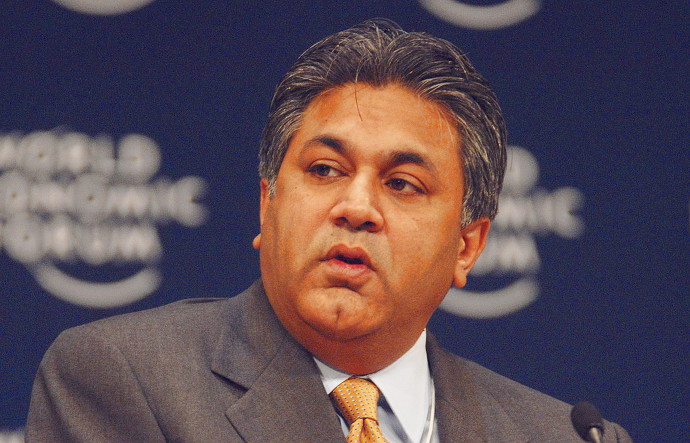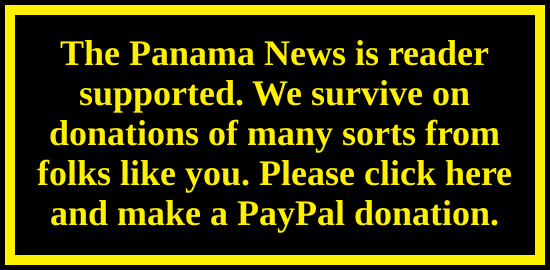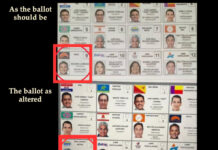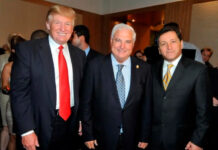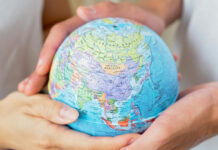“We have taken the risk out of investing in what the West mistakenly calls ’emerging markets,’ ” he says in elegant, Pakistani-accented English from a Madison Avenue outpost. “They’re growth markets….” Arif M. Naqvi, quoted in a gushy 2015 Forbes profile. The WikiMedia photo is from 2008, when he was a superstar at the World Economic Forum on the Middle East.
The Panama connections are but footnotes — the real story is the health care fraud in which the high and mighty wanted to believe
Death of a neoliberal dream
by Eric Jackson
If you are a billionaire concerned about populists of one sort or another who might tax your fortune, you would be in line with your peers if you stashed it away in various havens with banking and/or corporate secrecy. Panama, like the British Channel Islands, the US State of Delaware, the Cayman Islands, Dubai and various specks of Micronesia, is one of those sorts of jurisdictions. There are others.
Thus it was not a total shock when Pakistani businessman Arif Naqvi, a former accountant with the now late and scandal-tainted Arthur Andersen firm, was mentioned in The Panama Papers. Mossack Fonseca set up a pipeline via which things would flow from a British Virgin Islands company, through its officer entity Abraaj Club Holdings Ltd, to an apartment in Dubai. Naqvi was already by then the owner of Saint Honoré, a Panamanian company that was founded as a Colon Free Zone perfume wholesaler but which he turned to other unspecified purposes after he acquired it.
Abraaj? An Arabic male name that means “gift of God” or “beautiful-eyed,” now common in various languages in various renditions throughout the Muslim world. But in the corporate world that’s a group of entities centering around Arif Naqvi and based in Dubai. The Abraaj Group began in 2002 and became the Middle East’s largest private equity firm.
The Abraaj group’s rise coincided with the peak and fall of the oil economy, the transformation of the United Arab Emirates from a gritty but very rich oil patch to a gleaming financial center and most of the Gulf oil sheikhdoms from peaceful collectors of the world’s energy rent to jihadi firebrands. It’s a downside of the “monetization” of economies that produce things into systems where abstract financial transactions that often have little to do with anything tangible are the name of the game.
But billionaires will be billionaires. They congregate. They have done well for themselves in a world of deregulation, subtle transfers of fortunes across international boundaries, privatization, “market solution” political dogma and bottom lines seeming to have little to do with anything real. In short, they have been the beneficiaries and proponents of neoliberal economics.
Socialized medicine? Can’t have THAT. Need a MARKET solution, lest someone like a boricua bartender from the Bronx become the symbol of the future. So when Mr. Naqvi went into the health care business, there were people who wanted to believe. They wanted to believe in Abraaj Growth Markets Health Fund, which would bring high-quality private health care to South Asia, Africa and eventually Latin America.
The Bill & Melinda Gates Foundation bought in. Kuwait’s social security system bought in. The World Bank Group’s International Finance Corporation bought in. Uncle Sam’s OPIC bought in. The health fund raised a billion dollars. And it was all a swindle, a combination ponzi scheme and shell game with the many pieces of the Abraaj group. As in grossly overvalued assets. As in new investment used to pay debts to older investors. As in no such thing as a Third World private health care boom, or even any start on one.
In the middle of last year the Kuwaitis and the Gates Foundation demanded an accounting, with Kuwait leading the line of creditors at the courthouse in the Cayman Islands, where Abraaj is for the most part registered. Deloitte and PricewaterhouseCoopers (PwC) were appointed as receivers, with the former moving to pull out unless given more money some guarantees about they themselves not being prosecuted over decisions made in the restructuring and selloff. Arif Naqvi was forced out as CEO and managing partner Mustafa Abdel-Wadood was obliged to resign late last year. Then, on April 11, the US warrants came unsealed. Abdel-Wadood was busted at a hotel in New York, where he was staying on a trip for his son to look at upscale US universities. Naqvi was arrested a few hours later in London with US authorities seeking extradition. The indictment was about wire fraud, securities fraud and conspiracy to commit these offenses. It’s likely that there will be a superseding indictment, as plans to make arrests were moved up when Abdel-Wadood suddenly showed up in the United States without the US Justice Department expecting it.
Are there businesses for outraged Panama residents to boycott? Apparently not. At the end of January Abraaj’s Latin American assets were sold. Although the Abraaj Latin America Fund II, LP business hype — published on the Inter-American Development Bank’s website, of all places — talked about investments in Panama, it appears that there were indirect at the time of the collapse. For example, Abraaj bought the Selina hotel group from its Mexican owners and that chain operates four mid-range hotels or hostels catering to tourists in Panama. It also bought Colombia’s biggest private label food processor, QBCo, which does export to Panama but is a minor player on the market here. Now all of these assets are owned by Colony Capital, a hedge fund based in Santa Monica, California.
So quality private health care systems in the Third World go the way of ENRON, the dot.com bubble, mortgage-based securities, Willow Bay’s gushy talk about a new economy and, looking back a bit, the Dutch tulip bubble. But the Davos crowd thought it was so very important to believe.
These links are interactive — click on the boxes

